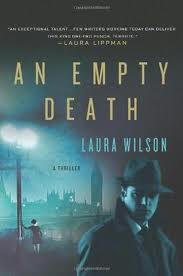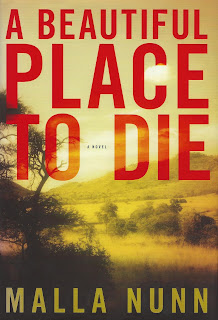I skipped a reading summary for March so this is a combo summary for March and April. I read ten books in March and five in September. In April, all the books I read were crime fiction. In March, I read a biography, a graphic novel, two books of general fiction, and a fantasy novel, in addition to crime fiction novels.
Nonfiction / Biography
The Sisters: The Saga of the Mitford Family (2001) by Mary S. Lovell
After reading The Six by Laura Thompson, I felt like I could benefit from another look at the Mitford family. I hoped for more information about Jessica, Pam and Deborah. And I definitely got that. Also more about their parents, although their brother Tom was only touched on. See my full review here.
Graphic novel
A Man and His Cat, Vol. 3 (2019) by Umi Sakurai (Writer and Artist)
There are 10 volumes in this Japanese manga series. In the first volume, a widower, Kanda, seeks a cat as a companion, and finds his perfect match at a pet store. The man falls in love with his new cat and names him Fukumaru. The stories in the first and second volume are mostly about Kanda learning to live with and take care of a cat. In the third volume, some earlier relationships in his life are explored. I will be reading more in this charming manga series. See my review of volumes 1-3.
General Fiction
Mrs. Palfrey at the Claremont (1971) by Elizabeth Taylor
Mrs. Palfrey, a widow living on a fixed income, has just moved into an extended residence hotel in London. There are a small number of older residents who are living there permanently. She is proud and trying to fit in, and ashamed that she has no one to visit her. It explores the time in life when people are alone and moving toward a time when they need more care, so it is not very upbeat but also not a complete downer. It was a very good book and I will be looking for more by this author.
Dear Life: Stories (2012) by Alice Munro
I started reading this book of short storied in November 2022 and finished them in March of this year. There are fourteen stories in the book. Some of them are exceptionally good and I liked the stories overall very much. Alice Munro is a Canadian author and I liked the Canadian setting. I will be reading more of her short stories. See my posts on the first eight stories and the next six stories.
Fantasy
Assassin's Apprentice (1995) by Robin Hobb
I haven't read a lot of fantasy, and certainly not a lot of high fantasy. This first book in the Farseer Trilogy by Robin Hobb has a medieval fantasy setting. I took a chance on this one because of Cath's review of The Mad Ship from the Liveship Traders Trilogy by the same author. I loved it and I will be reading more of the trilogy. My review is here.
Crime Fiction
Time to Murder and Create (1976) by Lawrence Block
This is the second book in the Matthew Scudder series. I read the first book in the series back in 2011 and it took me this long to return to it. My goal is to read as many books in the series as I can; there are 17 books. In this novel, Matthew is hired by a criminal to avenge his death. The criminal, who has been supporting himself with blackmail, supplies Matthew with information on his current victims, as he suspects one of them of planning to murder him. I enjoyed this book and read it very quickly, but I suspect that the series get much better as it goes along.
Baby, Would I Lie? (1994) by Donald Westlake
This book is the second book in a two-part series about Sara Joslyn and Jack Ingersoll. Both are journalists, and they are covering the trial of country singer Ray Jones for the rape and murder of Belle Hardwick. See my review here.
The Mask of Memory (1974) by Victor Canning
The Mask of Memory is the third book in the Birdcage series. The series is about a covert security group in the UK, a branch of the Ministry of Defense. In this book, one of the top agents is leading a double life. He is married to a woman who lives in North Devon; she does not know what he does for a living and sees him infrequently. No one in his group knows that he is married, or of the existence of the home in North Devon. I enjoyed the first two books in the series and this one was also very good. I will be moving on to the fourth book in the series, The Doomsday Carrier, soon.
4:50 from Paddington (1957) by Agatha Christie
This is the 7th Jane Marple mystery. Jane Marple's friend Elspeth McGillicuddy sees a man strangling a woman in a passing train. She tells the railway officials and later the police, but no one can find any evidence of a crime, and they don't really believe her. Jane Marple decides to investigate. After finishing almost all the Hercule Poirot novels in 2021, I now want to finish up the Miss Marple series.
Murder in a Nunnery (1940) by Eric Shepherd
The first of two short novels set in Harrington Convent. I read this book for the 1940 Club organized by Simon at Stuck in a Book and Karen at Kaggsy's Bookish Ramblings. My review is here.
Bad Faith (2002) by Aimée and David Thurlo
Bad Faith is the first book in a series about a nun who solves mysteries. The setting is in New Mexico. Sister Agatha is an extern nun who deals with the outside world for her order. I liked the mystery but the really interesting part was reading about the cloistered nuns and their daily life. There are only six in the series and I would definitely read more of them if I have the time.
The So Blue Marble (1940) by Dorothy B. Hughes
This book was Dorothy B. Hughes' debut mystery novel. It is unlike any other book by Hughes that I have read. In a Lonely Place and Ride a Pink Horse are noir novels, with a much more serious tone. This one is also on the noir side but more fantastical, and requires a good bit of suspension of disbelief. See my review here.
The Blind Man of Seville (2003) by Robert Wilson
Although I had decided earlier to stop reading Robert Wilson's novels because most of them had too much graphic violence and sex for me, I took a chance on this book, because it is set in Seville, Spain. This book did have those elements, but I was glad I took a chance on the book. The setting and character development was very good.
The Echoing Strangers (1952) by Gladys Mitchell
This is the 25th novel in Gladys Mitchell's Mrs. Bradley series. There are two plot threads. The first takes place mostly in the village of Wetwode on the River Burwater, where Francis Caux lives with his guardian, Miss Higgs. A murder victim is discovered near to the riverside bungalow that Francis lives in. The second follows a separate murder investigation in the village of Mede, where Derek Caux, Francis's twin, lives with his grandfather, Sir Adrian Caux. I read this book as part of a group read hosted at Jason Half's blog. The first of four posts about the novel is here.
Body Line (2011) by Cynthia Harrod-Eagles
I used to love the Bill Slider mystery series but got side-tracked. In April, I decided to pick it up again with Body Line, the 13th book in the series. I had just finished a very violent and dark police procedural and I wanted to go in the opposite direction. There is a strong focus on the lives of the two major characters (Slider and his partner Atherton) in addition to the investigation of the crime. I will be looking for the next in the series.
My husband was on jury duty for a few days recently. The images at the top and bottom of the post were taken at the Santa Barbara County Courthouse, while he was there. The courthouse building has lovely grounds and architecture. Click on the images for the best viewing quality.





























